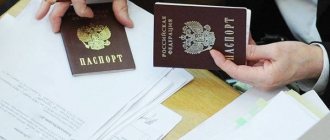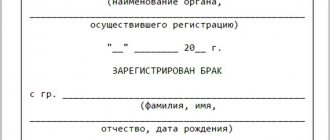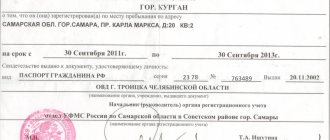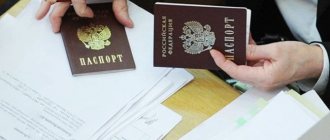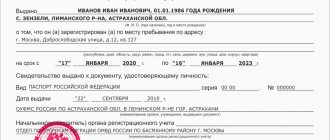Temporary registration in a rented apartment
To register a minor child, the consent of the citizens living in the apartment is not required. Registration at the place of stay and place of residence of minor citizens with parents (adoptive parents, guardians, trustees) living in residential premises owned by other citizens is carried out regardless of their consent. This is reflected in the Decree of the Government of the Russian Federation dated July 17, 1995 No. 713 “On approval of the Rules for registration and deregistration of citizens of the Russian Federation at the place of stay and place of residence within the Russian Federation and the list of officials responsible for registration.”
What does temporary registration mean for the owner, common risks
Tenants have the right to register a minor child without the consent of the apartment owner
Property rights are well protected by law.
However, we should not forget that having formalized such relations with residents or lodgers, it is necessary to understand what the consequences of temporary registration are for the owner of the apartment.
The law exempts mothers and fathers from obtaining the consent of property owners for the purpose of registering a minor.
A situation is possible when a person tries to register his child in a rented apartment for a period longer than personal registration. This situation can arise due to the inattention of employees of the Federal Migration Service (FMS) and the absence of regulations that precisely regulate the timing of registration of children.
As a result, the parent, after the end of his registration period, has the right, through the court, to register again at the address of his child.
In order to avoid this, when moving in, it is better to find out about the employer’s children. When registering, it is important to control the dates of registration for mothers, fathers and their children
When renting out real estate, the owner must provide registration at the place of residence.
Otherwise, the owner may have the following consequences:
- imposition of sanctions from one hundred to five hundred thousand rubles, as well as forced labor or imprisonment for a maximum of 3 years;
- the employer has the right to carry out the registration process with the help of the court;
- if close relatives of the owner live in this way or the residents have a permanent address in the same city, punishment is not applied.
When calculating the rent, meter data is taken or it is calculated according to tariffs, taking into account the number of tenants living in the apartment
When the owner of the property, upon concluding a special agreement, refuses to temporarily register the tenant of the apartment, the latter, in order to protect his interests, can contact the FMS and independently obtain this type of registration.
Increases in the amount of rent for this type of registration depend on the availability of special meters.
In their absence, payment will be calculated at rates multiplied by the number of residents.
Therefore, it is important to include this nuance in the contract.
Resident registration
Documents for registration in an apartment submitted within ninety days from the date of residence; the registration procedure itself takes 8 working days and to obtain registration you must come to the reception in person (you must have a certified signature). Categories of citizens have been identified who do not need to register at all, regardless of how long they live at an address different from that indicated in the certificate of registration at the place of residence.
We recommend reading: Military sanatorium of the Russian Federation
Temporary registration under a residential lease agreement
Russian legislation obliges citizens to register at their place of residence, provided they live at an address other than their registration for 90 days.
Moreover, a citizen can register both in the apartment of relatives and friends, and in rented housing.
A residential tenancy agreement is commonly referred to as a lease agreement. Although this name is not entirely correct from a legal point of view. If an apartment is transferred for temporary use to an individual, then a rental agreement is concluded. If the tenant is a legal entity, then we are talking about a lease agreement.
If you want to find out how to solve your particular problem in 2020, please contact us through the online consultant form or call:
- Moscow.
- Saint Petersburg.
Each owner of an apartment has the right to freely dispose of it at his own discretion.
He has the right to sell it, donate it or rent it out. In the latter case, he is obliged to conclude a rental agreement with the tenant.
The provisions of the tenancy agreement protect the rights of the parties and fix their responsibilities. Thus, the rental agreement for residential premises stipulates such important aspects of the relationship between the owner and the tenant as the validity period of the rent, the amount of the monthly rent and other points, and, if necessary, the possibility of obtaining temporary registration.
The law allows for the possibility of renting out housing without officially registering a tenant in it in the following cases:
- if the housing is rented by his relatives;
- the tenant lives in the apartment for less than 90 days.
Otherwise, the tenant is obliged to inform the FMS about the address of his actual residence and register a temporary registration at the address of the rented apartment.
Registration of temporary registration in a rented apartment is carried out in the standard manner. The only thing that needs to be taken into account is the need to submit, as part of the set of documents, the written consent of all apartment owners for the temporary registration of a certain person at the place of residence.
The owner of a residential premises may not register a tenant if he lives there for a relatively short period of time: less than 90 days. Migration service employees have no right to carry out registration actions without his consent, even if the tenant has a signed lease agreement in his hands.
If a tenant lives in a rented apartment for more than 3 months, then the owner is obliged to take measures to register the tenant with the Federal Migration Service. Otherwise, he commits an administrative offense, which is punishable by a fine of 2000-3000 rubles.
Although in practice it is very problematic to prove the fact of a tenant’s residence for a long time and it is not easy to hold the owner accountable.
The lease agreement may stipulate the owner’s obligation to provide written consent to temporary registration. But you don't have to do this.
In the absence of this clause, relations between the parties will be regulated in accordance with the norms of the Civil Code and the AIC, which state the obligation of the owner of the living space to temporarily register a tenant, provided that he has lived in the apartment for more than 90 days.
Registration of temporary registration has certain pros and cons for the owner.
The positive aspects for the owner include the absence of potential problems with the law. If the tenant is registered in the apartment legally, then he does not have to worry about possible penalties from tax authorities or migration service employees.
Many owners are reluctant to register their tenants due to fears that they will eventually lay claim to the property. In fact, such fears are unfounded. Temporary registration does not provide any legal grounds to claim housing, but only secures the right to legally reside in a given living space.
The tenant will not be able to apply for the apartment, even if he invests money in its maintenance and repairs. Ownership rights can only arise as a result of concluding a purchase and sale agreement or registering a deed of gift. They do not arise under a lease or rental agreement.
Of course, temporary registration is not without its disadvantages:
- The size of the utility fee will increase (although usually the responsibility for paying it is shifted to the tenant).
- If a tenant takes out a loan and does not repay it, then collectors will visit the debtor at his registered address.
- All fines from the traffic police will be sent to this address.
- If the tenant is liable for military service and evades military service, then the military registration and enlistment office employees will look for him at the specified address.
Having official registration at the place of residence has many advantages for the tenant.
Thus, he has access to a wide range of government and commercial services: the right to receive medical services in a clinic, educational services in a school or kindergarten, obtaining a loan and obtaining insurance, employment, etc. Thus, the presence of temporary registration can significantly improve the quality of life tenant and eliminate a number of administrative barriers.
More on the topic Lifelong maintenance agreement with the right of inheritance of housing
There will probably be virtually no disadvantages for a tenant from obtaining a temporary residence permit. This procedure is free for him. At any time he can terminate the temporary registration. At the same time, his permanent registration is not canceled and remains in force.
Disadvantages may arise for residents if they have problems with regulatory authorities, since, if necessary, tax authorities or bailiffs can easily find them at their place of actual residence.
Or on the website. It's fast and free!
Temporary registration in a rented apartment
Having quoted part of paragraph 9 of the Rules for registration and deregistration of citizens of the Russian Federation at the place of stay and place of residence within the Russian Federation and the list of officials responsible for registration, you forgot to include that paragraph that lists the documents necessary for the place of stay, including which indicate a certificate of state registration of the right to residential premises or an application from the person providing the citizen with residential premises.
Legal advice
What documents are needed to register a person in a municipal apartment if he is already registered in a privatized one.
A citizen’s registration in a privatized apartment is by no means a reason to limit his right to be provided with apartments from the municipal fund. Housing legislation establishes a number of grounds that presuppose that a person registered in a privatized apartment or house has the right to such housing. According to paragraphs. 2, 3 and 4 hours 1 tbsp. 51 of the RF Housing Code, this is possible if:
- Providing a citizen with a total living space less than the accounting norm (each municipality has its own norm).
- Living in premises that do not meet the requirements set by Chapter II of the Decree of the Government of the Russian Federation of January 28, 2006 No. 47.
- Living with a citizen of a person who suffers from a serious chronic illness (if it is impossible to be in the same room with him).
At the same time, according to Art. 91.3 of the Housing Code of the Russian Federation, citizens should not have an income that gives them the opportunity to purchase or rent housing. Documents confirming the relevant grounds are:
- Certificate of income.
- Extract from the house register.
- Medical certificate about the health status of a sick citizen.
Providing these documents is necessary to be recognized as needing housing from the municipal social use fund. The registration procedure remains standard, since for registration it is necessary to provide a list of documents on a general basis, including a rental agreement concluded with the local government.
Registration of a foreign citizen.
Foreign citizens, as well as stateless persons, who are in Russia on the basis of a permit or residence permit, must be registered in the appropriate premises, like any other citizen legally residing in the territory of the Russian Federation. The registration procedure for this category of persons is regulated by Chapter 3 of the Federal Law “On Migration Registration of Foreign Citizens and Stateless Persons in the Russian Federation.”
- Article 14 of the Federal Law “On Migration Registration...”:
- “A foreign citizen permanently or temporarily residing in the Russian Federation who has the right to use residential premises located on the territory of the Russian Federation is obliged, in the manner and under the conditions established in accordance with this Federal Law, to register at the address of the specified premises.”
Provisions of Part 1 of Art. 17 of the Law provide an exhaustive list of documents necessary to carry out this procedure:
- A document that proves a person's identity. In the vast majority of countries, this is a passport, but in some states other documents may be required. Accordingly, stateless persons do not need to provide it (since they simply do not have it).
- Application in the form established by FMS Order No. 287 dated October 23, 2010. The form and samples can be found at the FMS body where registration is carried out.
- Permit or residence permit. It is issued by the territorial body of the Federal Migration Service, where the person applied with the application.
- Documents that confirm the person’s right to use the premises specified in the application. Since foreigners cannot own real estate in Russia, this category includes lease agreements, rent agreements, as well as other transactions involving the provision of premises for use.
Video
Registration at the place of residence. The TV assistant “My Documents” narrates.
https://youtube.com/watch?v=6bAYIZAJwXc%3Frel%3D0%26controls%3D0%26showinfo%3D0
Registration in a rented apartment: studying the rights of a tenant
It would seem that the process of registering in a rented apartment is quite simple, but in reality everything is not so easy. As experts advise, it is best to decide on the possibility of temporary registration in a rented apartment with its owner before concluding a rental agreement. By the way, the tenant of the apartment may demand to include a registration condition in the contract, because according to the law he can appeal against the actions of the owner who violates the right to choose a place of residence and stay within the Russian Federation. Theoretically, a citizen who is interested in renting an apartment can appeal to a local court with demands to oblige the owner of the property to assist in registration. Therefore, it is best to agree in advance. You can, for example, attend a legal consultation, in which the owner of the apartment can make sure that no one will deprive him of his property as a result of the temporary registration of the tenant.
Registration at the place of stay in mortgaged housing
A separate point is temporary registration in a mortgaged apartment. Buying a home using mortgage lending always involves keeping the apartment as collateral until the debt is fully repaid.
In this case, there are restrictions imposed by the bank or other credit institution that holds the apartment as collateral.
Such an encumbrance limits some of the owner's rights. Although the Civil Code of the Russian Federation and the Housing Code of the Russian Federation are in conflict with this situation, there is a possibility of being refused temporary registration on the basis of the apartment being under mortgage.
The refusal to issue temporary registration is disputed in court in the case where the restriction on any form of registration of third parties in the apartment is not expressly provided for by the terms of the mortgage agreement.
Some facts The new edition of the registration rules provides for the possibility of applying to the FMS by mail or via the Internet (through the public services portal).
Does everyone need registration in Moscow?
How to make a temporary registration? Is it really necessary for all foreigners? Citizens of another country, if they are highly qualified specialists, can stay in the Russian Federation for up to 90 days without registration. Even with their families. The countdown begins with customs clearance. Also, registration will not be required for heads of other states or heads of well-known international companies (and their families).
Crews of warships or aircraft are also exempt from temporary registration. As well as employees of trains, air and ships involved in the international transport of passengers and goods.
Registration and payments
Many people are interested in the question: does temporary registration affect utility bills? Yes, and quite significantly. If the apartment has meters, then the consumption of water, electricity and gas, and, accordingly, utility bills may increase. You will have to pay the bills the same way as before, but the costs will be clearly higher. And even without meters, the payment may increase due to the fact that the number of registered people in the apartment has increased. It may also be a surprise if minor children are registered after their parents.
In order not to suffer from whether the rent increases, you can shift the cost of paying for utilities to tenants or other registered people. Another way to save money is to submit an application at your place of registration (permanent) stating that you have already paid for services at another address. In this case, the increase will not occur, since a recalculation will be made. Temporary guests do not affect the calculation of subsidies.
Read also: “Registration” at the place of residence or stay: what documents are needed for this
As you can see, temporary registration and utility bills are inextricably linked. When asked whether the rent will increase during temporary registration, you need to answer positively, but the amount of the overpayment will depend on how actively your tenants consume utilities.
Claims to the property of a temporarily registered
Not everyone understands what the main differences are that are provided for by registration at the place of residence, and everything here mainly depends on how exactly the person is registered at the specified address.
Social
In accordance with the current legislation, certain categories of citizens are provided with the possibility of being provided with an individual place of residence, and this is done for the following reasons:
- lack of housing, which a citizen uses as an owner or tenant, based on the terms of a social rental agreement or as one of the family members of the tenant or owner;
- availability of housing less than the current accounting standard;
- the presence of an unsatisfactory condition of the housing in which the citizen currently lives;
- incorrect health status of any of the residents or the owner of the property.
The legislation answers the question of whether it is possible to obtain a license outside the place of registration in the affirmative; however, in practice there may be problems associated with passing a medical examination.
You can find out how registration at your place of residence is confirmed here.
All these grounds are indicated in Part 1 of the current Article 51 of the Housing Code.
It is worth noting the fact that there is a certain list of citizens who are provided with social housing out of turn:
- citizens whose housing is declared unsuitable for living in accordance with the norms of current legislation, if these premises cannot be repaired or reconstructed;
- orphans or children who are left without parental support;
- citizens suffering from severe forms of chronic illnesses listed in Government Decree No. 378, issued on June 16, 2006.
Commercial
Commercial rental, first of all, is provided to those on the waiting list, that is, those people who are in debt in order to provide housing. The main difference from social rent in this case is the dimensions of the provided living space, since social housing is provided no more than 18 m2, but provides for an increase to 33 m2 for a family of one person or up to 42 m2 for a family of two.
If the house belongs to the resettlement category, then one of the families may be provided with a sufficiently large area for living. In the vast majority of cases, this procedure is carried out with the aim of providing housing for children who have reached the age of majority, as a result of which a certain part of the family moves to an apartment obtained under social rent, while the other goes to housing registered as a commercial one.
We invite you to read: Let's consider how adoption differs from a foster family; is there a difference between them and child guardianship?
Among other things, the housing policy department can currently enter into a commercial rental agreement with young families for a period of no more than five years, as a result of which they will be provided with separate comfortable housing, which is not given into their ownership, but remains at the disposal of the city.
The term of the contract, if necessary, can be extended for another five years, but this possibility is provided only if the young family does not reach the age of 30 years. Thus, the city provides an opportunity for young families to provide themselves with separate housing, allowing them to save for their own apartment for five years.
Temporary
If a person intends to stay in a certain residential premises for more than 90 days, then in this case he must, by law, obtain temporary registration for himself.
To do this, you need to contact the relevant authorities and provide them with:
- registration application with your signature;
- passport;
- a document confirming the existence of grounds for temporary registration or an application provided by the owner of this property.
In addition, the new legislative acts also indicate that, if they wish, a citizen can submit an application for registration in person or by mail. Current laws only provide for the need for mandatory notification to the owner of the premises that a certain citizen has been registered on its territory.
Constant
After purchasing a certain home, its new owner must go through the registration procedure, which is carried out in three different ways, from which you can choose the most convenient one for yourself.
The standard option is a personal application to the passport office along with a full package of necessary documents, including:
- military ID;
- passport;
- documents confirming ownership and possession of the specified housing;
- documents of close relatives who will be registered in the new housing together with its owner.
To carry out the registration procedure, you first need to buy a special form from the accounting department of the management company, and it is better to prepare it in advance so that you do not have to waste extra time in the future.
Registration registration is carried out on the spot, and if the applicant is serving in the army, he will be provided with an apartment card, and it can later be presented at the military registration and enlistment office to ensure military registration. The card must be returned with the appropriate mark.
After being discharged from the previous place of residence, you need to register again within ten days, but if the discharge from the previous address did not take place, there is no restriction, since you can come with the application at any convenient time, after which the extract at the old place of residence will be issued fully automatically
To register at your place of residence, you must provide the following to the territorial Federal Migration Service:
- citizen identity card;
- written consent of the owner or tenant of municipal housing;
- written consent of the co-owners and all registered residents;
- document on the right to residential premises - a certificate of ownership or a social tenancy agreement;
You will find what documents to change when changing your registration here. An application on Form No. 1 with a request to register a citizen is written in his own hand by the owner of the housing provided or an authorized person of the administration of the institution where the citizen plans to temporarily reside.
After submitting documents to the Federal Migration Service, within three days the citizen must receive a certificate of registration at the place of residence. If you want to know how many people can be registered in a one-room apartment, then here it is.
Temporary registration in a municipal apartment is carried out with the consent of the tenant and all family members permanently registered in the apartment. Next we will tell you how to register in a non-privatized apartment.
For housing occupied under a social tenancy agreement, the legislation provides for several nuances:
- A citizen can be registered for a period not exceeding 6 consecutive months. This rule is regulated by Article 80.2 of the RF Housing Code;
- when registering temporary registration, the consent of the landlord is required, which he has the right to refuse if there is a lack of accounting norms for living space when moving in a new tenant;
- the figure approved and described in the Housing Code of the Russian Federation is 12 sq.m. per person differs in different regions of the country. Subjects of the Russian Federation autonomously adopt laws on established accounting standards for living space;
- a child registering with a temporarily registered parent does not need to obtain the consent of the owner, tenant or other residents.
Temporary registration in a privatized apartment requires the mandatory consent of the owner and other family members registered at this address. The registration procedure for private property owned by several owners has several features:
- it is necessary to obtain the consent of all citizens who have property rights and ensure their presence at the FMS when filling out the application;
- the discrepancy with the accounting norm for the number of residential meters per person does not play a role for private property - the owner has the right to register any citizen at will.
When staying for a long period of time, exceeding 90 days, in a hotel, sanatorium, hospital and other similar institutions, a citizen is required to register with the local branch of the Federal Migration Service.
In this case, the applicant is the head of the institution or an authorized person.
For a citizen, it will be enough to provide an identity card; all other actions for temporary registration will be carried out by the employees of the institution and the Federal Migration Service without his participation.
To exercise control within the country, the authorities are trying to streamline the internal migration process. That is why registration was introduced for a limited period.
That is, when a citizen of the Russian Federation lives for more than 90 days in a place other than his place of permanent residence, he is forced to temporarily register at this address. This requirement is specified in paragraph 55 of the Administrative Regulations.
How to apply for temporary registration
The simplest registration rules for those staying in hotels, medical institutions, boarding houses and the like. The responsibility to register them at the place of residence rests with the administrative employees of this organization. The citizen is only required to fill out a form and present an identity card.
Temporary registration in case of change of residence will require three stages, namely:
- Preparation of documents;
- The collected documents must be submitted to the migration service at the place of temporary residence;
- Obtaining a certificate of temporary registration.
In privatized housing, temporary registration is carried out with the consent of the owner or owners. Then the person must contact the migration service in person and submit completed forms and documents. In addition, the owner of the property must be present at the FMS to confirm his consent.
If the documents include a social tenancy agreement or a right of residence agreement, the authorized body will consider the application quickly and issue a certificate of temporary registration within 3 days. In the absence of such an agreement, the migration service has the right to conduct an inspection, which will require additional time. In this case, the period for processing and issuing a certificate should not exceed 8 working days.
1Why is the procedure for temporary registration of citizens necessary?
As you already understand, the concept of “registration” can be attributed to a permanent form of registration, while a temporary form has other reasons; it differs in the method of registration, and most importantly, in the period.
You will need temporary registration if you are not able to obtain a permanent registration in the place where you currently live. For example, if you rented an apartment for a long time, then its owner has completely legal grounds not to accommodate you on a permanent basis, but on a temporary basis he can.
- If you want to use the services of medical institutions at your place of residence, then temporary registration will help you with this;
- To obtain credits and loans;
- To enroll a child in school or kindergarten;
- Registration is often required for official employment;
- Preparation of documentation: passports, certificates, certificates and others;
- Any measures of social support for the population.
Registration of children
How to register minors in a rented city apartment? Usually they are registered at the address where the parents are registered, and the consent of the owner, the owners of the apartment in shared ownership is no longer necessary. We are talking about children under 14 years of age. After reaching this age, the child can be registered separately from the parents, but only if they agree to this. To register a child under 14 years of age you must:
- identity documents (passport, birth certificate);
- title papers for housing or rental agreement;
- consent of one of the parents;
- completed application for temporary registration.
The periods for which children are temporarily registered are not defined by law. According to the rules, they are registered at the same time as the parents and for the same period. When enrolling in a school, those children who live in the same area usually have advantages. If you want to get a job at an educational institution far from home, you can make temporary registration at an address close to it (if possible). To register for children, parents fill out an application to the UVM.
The timing of temporary registration of children must receive the approval of the owner of the apartment and everyone who is registered there (if the housing is municipal). A very important point: temporary registration does not require cancellation of permanent registration and does not affect it in any way. It runs out quickly and serves a specific purpose.

